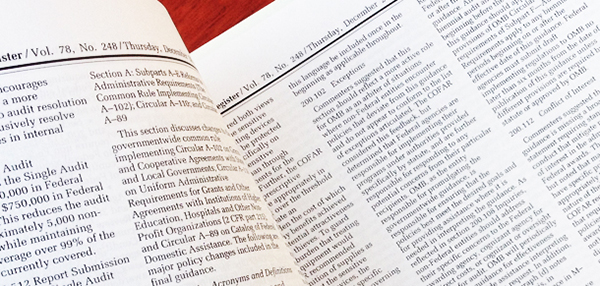Get Funding.
Create Change.
You are here
The Super Circular: Who Benefits?

Approximately 360 individuals and organizations commented on the proposed Circular that was adopted as final on December 26, 2013 in the Federal Register (pages 78589 to 78691). The question is who benefits from the new rules and why does the Super Circular matter?
Approximately 65% of the comments received by the Office of Management and Budget (OMB) came from colleges and private nonprofit organizations. Indian tribal governments were the second largest group of commenters, followed by the audit community, individuals, and state and local governments.
When it comes to regulatory action in the grants arena, the regulator holds the best cards, but this does not mean that those who take the time to comment do not benefit. In the case of the new Super Circular, the college and university community will benefit most. Led by the powerful Council on Government Relations (COGR), the colleges and universities ensured that the final text of the Super Circular looked much more like the old circular A-110 than circular A-102. Colleges and universities won big in the areas of cost policy and management, as many of the revised cost definitions and tweaks favored their interests.
Indian tribal governments and organizations representing Native American interests focused on a single issue: exempting their audits from public disclosure largely on the premise of keeping their gaming revenues confidential. Because of their work, tribes with gaming operations will benefit from an audit exemption.
The audit community largely supported the proposed changes in the Super Circular. The benefit that they derive from participation is an increased attention on internal controls as a key component of compliance.
Less than 10 comments came from state and local governments, and no comments were filed by the key organizations representing state and local governments other than the audit community. Absent from the comment process were such organizations as the National League of Cities, the National Governors Association, and the International City-County Managers Association.
Would greater comment participation by state and local governments and their supporting organizations have made a difference? If you consider the role of colleges and universities in the comment process, and the ways in which that group will benefit, the answer is definitely yes. The colleges and universities submitted detailed comments on many of the proposed changes and they were backed by the powerful COGR. It made a difference.
The lesson is that if you want to have an impact, and to protect the interests of your organization, you need to participate actively in large regulatory changes.
—Henry Flood, Senior Advisor
We welcome you to link to these pages and to direct people to this information on our site.
Please contact us for permission if you'd like to use this copyrighted material in some other way:
info@tgci.com. We love to hear from you!
© Copyright 2014 The Grantmanship Center. All rights reserved.
You're welcome to link to these pages and to direct people to our website.
If you'd like to use this copyrighted material in some other way,
please contact us for permission: info@tgci.com. We love to hear from you!
A follow-up study of 385 of our graduates found documented that they won grants totaling over $21 million within just six months of completing the 5-day Grantsmanship Training Program®. Our training produces results!

